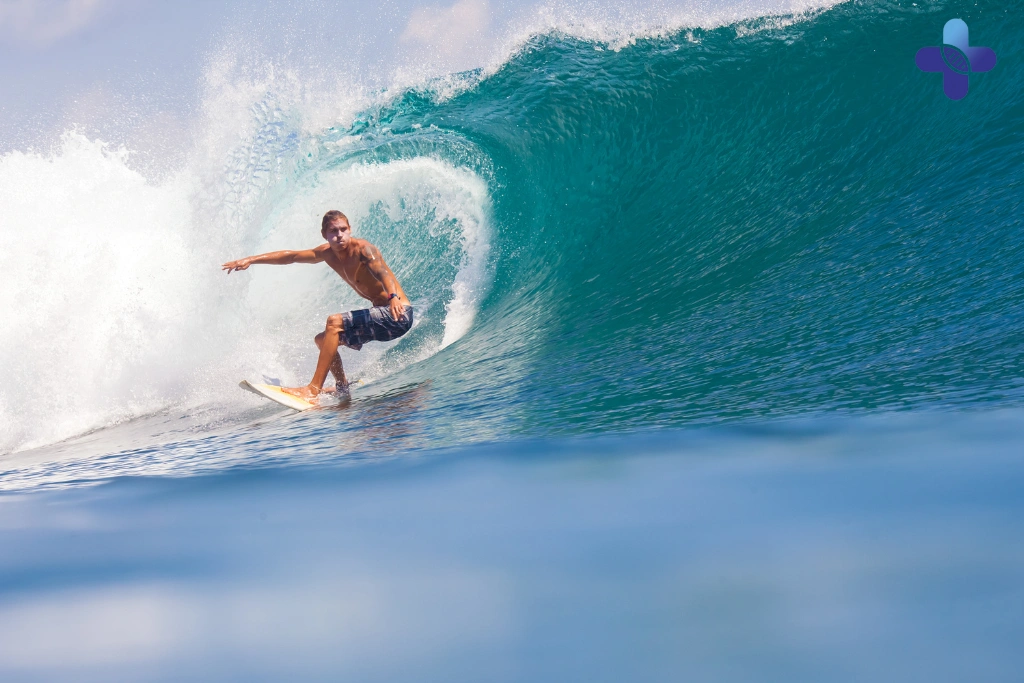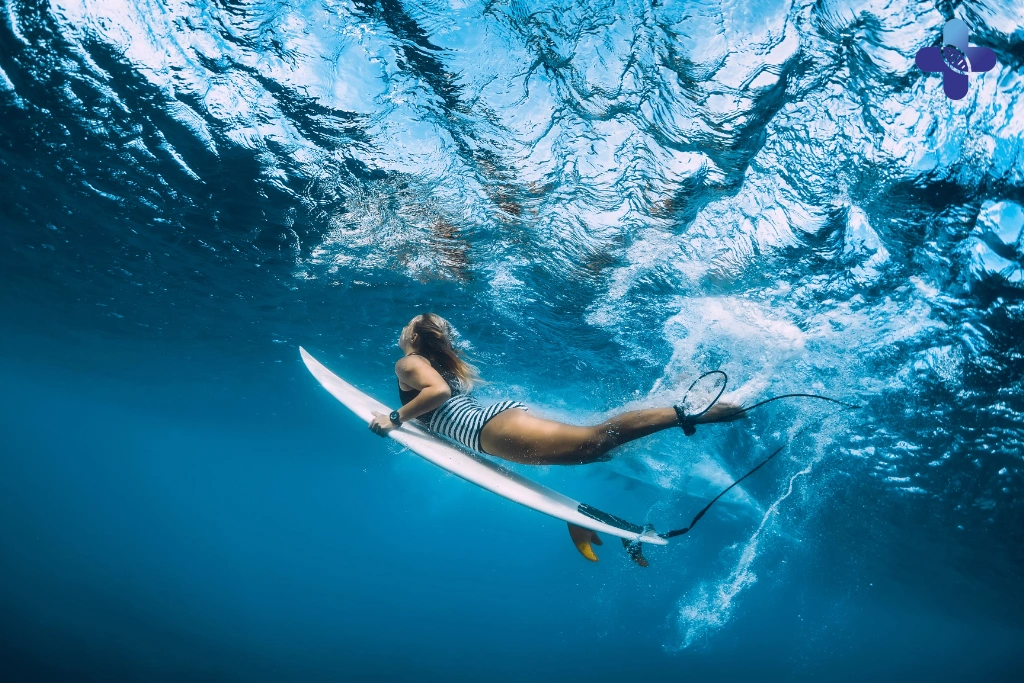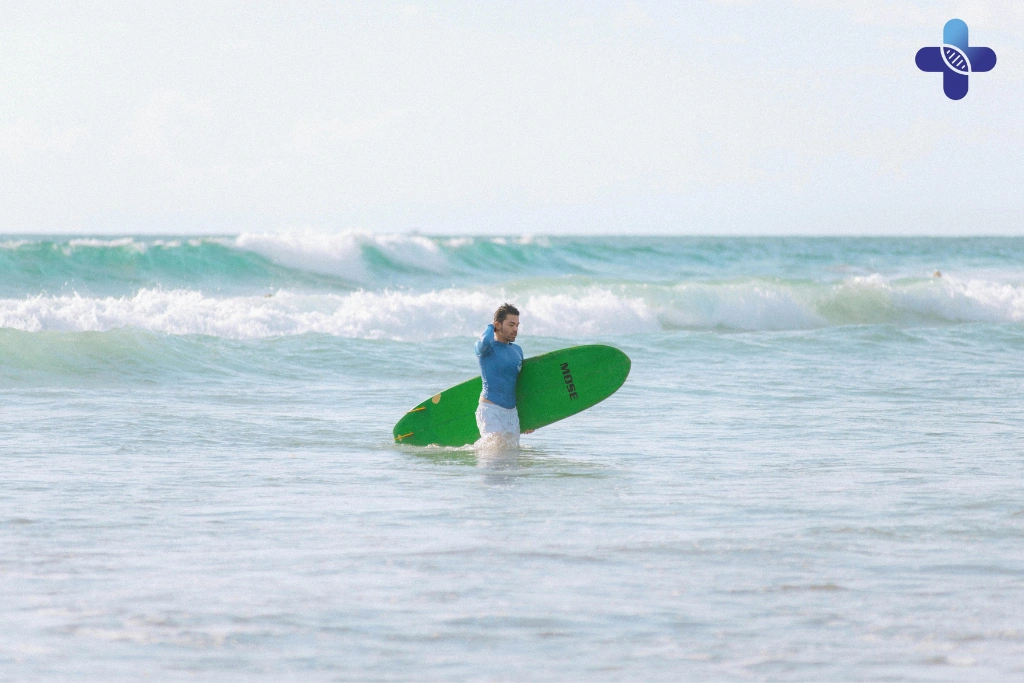Bali is a surfer’s paradise, but the reefs, waves, and tropical climate come with their own set of health challenges. From sharp coral cuts to painful ear infections, knowing how to handle these common surfing injuries can mean the difference between chasing barrels or being stuck in bed. This guide is your go-to resource for surfers health Bali, offering practical, no-nonsense tips to keep you in peak shape during your trip. Whether you’re paddling out in Uluwatu or catching your first wave in Canggu, Life Everyouth Bali—a trusted Medical Clinic in Bali—is here to help you stay safe, surf-ready, and informed.
The Essential Surfer’s Health Guide to Bali

Bali is a surfer’s paradise, but its powerful reef breaks demand respect, both in and out of the water. While the waves offer world-class rides from Uluwatu to Canggu, the ocean here can leave you with more than just memories—think reef cuts, ear infections, and tropical sun fatigue. For many surfers, these “battle scars” are part of the lifestyle, but knowing how to handle them properly means less time healing in your hotel room and more time chasing waves. This guide covers the essentials of surfers health Bali, giving you straight-up advice on how to prevent and treat Bali surfing injuries, from reef rash to dehydration. Whether you’re a beginner or seasoned charger, Life Everyouth—a leading Medical Clinic in Bali—has your back in and out of the lineup.
The #1 Issue: Mastering Coral Cut & Reef Rash Treatment
Getting “worked” by a shallow reef break in Bali is almost a rite of passage for surfers—but coral cuts are no joke. Unlike sand or rock, living coral is sharp, porous, and teeming with bacteria. A small scrape can quickly turn into a serious infection if not treated properly. That’s why every surfer should understand the basics of coral cut treatment Bali. Reef rash and lacerations from coral often go deeper than they appear and can trap tiny particles inside the skin, making proper cleaning essential. At Life Everyouth Bali, our team frequently sees reef-related injuries, and as a trusted Medical Clinic in Bali, we help surfers recover fast and stay out in the lineup longer.
Step-by-Step: The Right Way to Clean a Reef Cut
Step 1: Rinse the wound immediately with clean drinking water—bottled water is best. Avoid seawater, which may introduce more bacteria.
Step 2: Use clean tweezers to gently remove visible debris, coral fragments, or grains of sand. Be thorough but gentle.
Step 3: Wash the wound using antiseptic soap or povidone-iodine. Yes, it will sting—but this step is crucial to kill bacteria and prevent reef cut infection.
Step 4: Pat the area dry with sterile gauze and apply an over-the-counter antibiotic ointment. Cover loosely with a clean dressing if needed.
This method is the gold standard for initial coral cut treatment Bali surfers can apply themselves before seeking help from a Medical Clinic in Bali like Life Everyouth, especially if symptoms worsen.
Signs of Infection You Cannot Ignore
Even with good first aid, reef cuts can go south quickly. Watch for classic signs of reef cut infection: redness spreading from the wound, swelling, warmth, pus discharge, or a red line trailing from the cut. These are red flags. If you experience fever, fatigue, or increased pain, it’s time to stop self-treating and visit a Bali Medical Clinic. At Life Everyouth Bali, we provide proper wound care, antibiotics, and infection control—so your reef rash doesn’t turn into something far worse.
The Annoying Ailment: Preventing & Managing Surfer’s Ear
Among the hidden risks of long sessions in Bali’s warm waves is a condition surfers often overlook—Surfer’s Ear. Medically known as exostosis, it’s the gradual growth of bony lumps in the ear canal triggered by repeated exposure to cold water and wind. Unlike otitis externa, or swimmer’s ear, which is a bacterial infection of the outer ear canal, Surfer’s Ear is a structural change that can trap water, wax, and bacteria—leading to chronic ear problems. While many surfers in Bali brush off early symptoms, ignoring them can lead to infections, hearing loss, or even surgery. That’s why Life Everyouth Bali, a leading Medical Clinic in Bali, strongly recommends early prevention and awareness for surfers ear Bali cases.
Prevention is Key
The best treatment is prevention, especially in a place like Bali where warm tropical waters can make surfers complacent. Use custom or soft silicone earplugs during your sessions—they’re effective and don’t affect your balance. After each surf, tilt your head to drain trapped water, and dry your ears gently with a clean towel or tissue. Avoid jamming cotton swabs into your ears, as this can push debris further inside. These small steps can significantly reduce your risk of surfers ear Bali and keep your sessions uninterrupted. At Life Everyouth, we always educate patients on how simple habits can prevent visits to our Medical Clinic in Bali for avoidable ear issues.
What to Do if You Feel an Itch or Pain
An early sign of trouble—like itching, pain, or muffled hearing—shouldn’t be ignored. A proven home remedy is to apply a few drops of a 50/50 solution of white vinegar and rubbing alcohol in each ear after surfing. This helps evaporate trapped water and restores the ear’s natural acidity. However, do not use this if you suspect an active infection or perforated eardrum. If the pain intensifies or hearing decreases, it’s time to consult a Bali Medical Clinic. At Life Everyouth Bali, we offer safe, professional ear evaluations and treatment for surfers ear Bali, so your symptoms don’t keep you out of the water longer than necessary.
More Than Waves: Sun, Hydration, and Stamina

Surfing in Bali isn’t just about mastering the waves—it’s also about managing your body under the intense tropical sun. Long hours in the lineup can quickly drain your stamina, dehydrate you, and leave your skin vulnerable to serious damage. Many surfers underestimate the cumulative toll of heat, saltwater, and UV exposure, which can lead to fatigue, sunburn, and even heat exhaustion. At Life Everyouth Bali, we often see surf injuries that aren’t from reef cuts but from simple neglect of basic health needs. As a trusted Medical Clinic in Bali, we help surfers maintain peak condition so they can keep chasing swells safely. Optimizing your surfers health Bali means treating the elements as seriously as the waves.
The Bali Sun is No Joke
Don’t let the offshore breeze fool you—Bali’s sun is brutal. Water reflects and amplifies UV rays, and without proper protection, you’re at high risk for severe sunburn. Always use a high-SPF, reef-safe, water-resistant sunscreen, especially during midday sessions. For longer protection, apply thick zinc oxide on your face, ears, and lips. Pair that with UV-protective surf shirts or rash guards to shield your shoulders and back. Reapplying every two hours is non-negotiable. At Life Everyouth, we’ve treated countless Bali surfing injuries caused not by wipeouts but by sun overexposure. Let our team at this Bali Medical Clinic help you build habits that protect your skin and prolong your time in the water.
Hydration for Performance and Recovery
Staying hydrated in Bali’s heat is essential, yet it’s often overlooked in the rush to get in the water. Dehydration affects not only your stamina but also your recovery time and mental clarity—key factors when navigating reef breaks. Drink at least 500 ml of water before paddling out, sip during breaks, and rehydrate fully afterward. If you’ve had a heavy session or feel dizzy, tired, or crampy, an IV drip for surfers can dramatically restore balance. At Life Everyouth Bali, our Medical Clinic in Bali offers rapid hydration therapies designed to get you back to peak condition quickly. Your surfers health Bali journey depends not just on skill, but on how well you care for your body between sets.
When to Stop Self-Treating and See a Doctor
While self-care can handle minor scrapes and aches, there’s a point when every surfer needs professional help. Infections can escalate fast in tropical climates, and ignoring symptoms could mean missing days or even weeks of surf. At Life Everyouth Bali, we’ve seen too many cases where a simple reef rash turned into a hospital visit because it was left untreated. As a trusted Medical Clinic in Bali, we’re here to support your surfers health Bali journey—before things go sideways. Knowing when to stop self-treating could save your trip, your ear, or even your limb.
See a doctor immediately if you experience any of the following:
- A deep wound that may need stitches
- Clear signs of infection like swelling, heat, pus, or a red streak
- Persistent or severe ear pain, especially after surfing
- Fever or body aches following an injury
If you see any signs of infection or the injury needs professional assessment, our 24-hour doctor on call service can treat you at your villa, so you don’t miss the next swell. Trust Life Everyouth, your Bali Medical Clinic partner, to get you back in the water—fast, safe, and stronger.
Conclusion Bali Surfer’s Health Guide: Treating Coral Cuts & Ear Infections

Look after your body, and you’ll be rewarded with more perfect Bali waves. Whether you’re paddling out at dawn or nursing a reef cut after sunset, taking your health seriously is the key to a longer, better surf trip. From coral cuts to surfer’s ear and sun fatigue, every challenge can be managed with the right knowledge and support. At Life Everyouth Bali, we understand the rhythm of a surfer’s life, and our Medical Clinic in Bali is built to serve that lifestyle—fast, accessible, and expert care when you need it most.
Don’t let a preventable injury steal waves from your trip. Whether you’re at your surf camp, hotel, or beachfront villa, Life Everyouth is ready to step in—so you stay on your board, not in bed. Reach out anytime for expert support from the Bali Medical Clinic that gets surfers.
Frequently Asked Question Bali Surfer’s Health Guide: Treating Coral Cuts & Ear Infections
What should I do immediately after getting cut on the reef, while still in the water?
If you’re bleeding heavily, get out of the water right away to avoid attracting bacteria or marine predators. For minor scrapes, you can safely paddle in, but prioritize cleaning the wound as soon as you’re on land. Rinse with clean bottled water—not seawater—and avoid touching the wound with unclean hands. Life Everyouth, as your go-to Medical Clinic in Bali, always recommends treating reef cuts quickly to prevent infection.
What are the clear signs my coral cut is infected?
Watch for redness spreading beyond the cut, swelling, warmth, and tenderness. If pus starts forming, or if pain increases after the first 24–48 hours, it’s a sign the wound isn’t healing properly. A red line extending from the wound is a sign of serious infection and may indicate sepsis risk. Visit Life Everyouth Bali, a trusted Bali Medical Clinic, immediately if you notice these symptoms.
Are there any home remedies for preventing surfer’s ear?
Yes, a common DIY method involves applying a few drops of a 50/50 mix of white vinegar and rubbing alcohol after each surf. This solution helps dry the ear canal and maintains the natural pH, which discourages bacterial growth. But if you have ear pain or suspect an infection, skip this method—it can worsen things. In that case, visit Life Everyouth, your surfer-friendly Medical Clinic in Bali, for a proper evaluation.
What is the best type of sunscreen for surfing in Bali?
Choose a reef-safe, mineral-based sunscreen with SPF 50+ that’s water-resistant for at least 80 minutes. For maximum protection during long sessions, apply zinc oxide on the nose, cheeks, ears, and lips—areas most exposed. Reapply every two hours, especially after wiping out. At Life Everyouth Bali, we frequently treat sunburns that could’ve been prevented with the right prep—stay protected, stay in the lineup.
Can I still surf with a minor ear infection?
It’s not recommended. Even a mild ear infection can worsen with repeated exposure to water, increasing the risk of eardrum rupture and long-term hearing damage. Surfing with pain or pressure in your ear is not worth the risk of a longer recovery. Let Life Everyouth, the reliable Medical Clinic in Bali, assess your condition and help you heal fast.
What essential items should be in my personal surf first-aid kit?
Your kit should include povidone-iodine (Betadine), antiseptic wipes, waterproof medical tape, non-stick gauze pads, and tweezers. Add vinegar and hot packs for sea urchin stings, and ear drops for post-surf care. These tools can help manage minor injuries until you access a Medical Clinic in Bali like Life Everyouth Bali. Always be prepared—it could make the difference between a short break and a serious setback.
How do I treat a sea urchin sting?
First, exit the water and soak the affected area in hot (not scalding) water for 30 to 90 minutes to neutralize toxins and reduce pain. Remove visible spines with tweezers, but don’t dig too deep—broken spines can embed in tissue and cause infection. Avoid vinegar for sea urchin injuries; it doesn’t help and can worsen irritation. Visit Life Everyouth Bali if you can’t remove all spines or the area becomes swollen or red—our Bali Medical Clinic handles this daily.
Is “Bali Belly” a bigger risk for surfers?
Yes—swallowing seawater while paddling or wiping out can expose you to bacteria, especially near river mouths or after rainfall. Combined with the change in diet and tropical microbes, surfers are slightly more vulnerable. Rinse your mouth with bottled water after each session and avoid eating with unwashed hands. At Life Everyouth, your trusted Medical Clinic in Bali, we can treat dehydration and symptoms fast—don’t let Bali Belly ruin your trip.
How do I know if my cut needs stitches?
You’ll likely need stitches if the wound is deep, over a joint, or gapes open and won’t close with pressure. If bleeding doesn’t stop after 15 minutes, or if you can see yellow fatty tissue inside the cut, seek help immediately. Avoid surfing with an open wound—it increases infection risk. Visit Life Everyouth Bali, where our doctors provide fast, clean, professional suturing at one of the best Bali Medical Clinics for surfers.
Can I get my infected cut treated at my hotel or villa?
Absolutely. Our 24-hour doctor on call service brings expert care directly to your location—no traffic, no clinic wait time. We can clean and dress wounds, assess for infection, and prescribe or administer antibiotics on-site. Whether it’s a coral cut or ear pain, Life Everyouth is the Medical Clinic in Bali that meets surfers where they are—so you don’t miss another swell.
